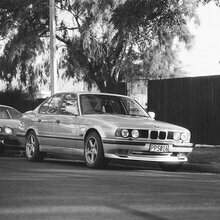-
Content Count
124 -
Joined
-
Last visited
Community Reputation
2 NeutralAbout R90S
-
Rank
2nd Gear
- Birthday 09/25/1959
Previous Fields
-
Name
Nick P
-
Location
Te Kauwhata
-
Car
2007 E61 525i
-
Car 2
'74 E3 3.0S
-
Car 3
2010 X5 E70 35D
-
Race Car
F1 sidecar
Contact Methods
-
Website URL
http://
-
ICQ
0
Profile Information
-
Gender
Male
-
Interests
classic BMW motorcycles, sidecar racing
-
I too have a 3.0S that has been in my possession for 15 years without moving. The previous owner stored it for 10 years too. It's an NZ new 1974 car with a tidy, near rust free body and tidy interior. Engine was cooked prior to my ownership. It continues to wait patiently while other projects jump the queue . . . .
-
Andy at RaceFX has a widebody CSL in his workshop undergoing an extensive rebuild at the moment. Saw it this week. Looks stunning.
-
We bought our M3 primarily for my wife to drive. She would probably think you were being rude . . . .
-
I will have a surplus set of steel 15" rims available sometime soon. I believe they were off an E34. Flick me a PM if you are interested.
-
This is a tragedy. Nobody plans to do a trackday expecting it to end like this. I have a few concerns though. So just how bad is the hump? I've ridden the track on my own bike at a "rider training" day and hadn't noticed it. Admittedly I was only doing about 190kph going past the pits, but I don't recall anything especially scary about that part of the circuit. I've noticed a bit of an outcry on another forum about the hump since Friday morning too, and it bothers me that I've not noticed anything said about it before now. It also bothers me that the track is being blamed already when there's been no time to examine the rider's bike to inspect it thoroughly for mechanical faults, or check that the rider hadn't blacked out etc. The rider involved was an experienced and capable rider according to a few comments made elsewhere, but that doesn't eliminate him from the equation either. And anyway, how many drivers/riders have lost their lives at Pukekohe over the years? It seems to be accepted that Pukekohe is a potentially more dangerous and unforgiving circuit, so is the kerfuffle with this rider's death primarily due to him holding the dubious title of the first fatality?
-
"For the man who's only tool is a hammer, every problem becomes a nail which must be pounded relentlessly". I do not envy the task of Police, ambulance drivers and fire crews attending fatal car accidents, and I'm grateful that they perform this thankless task day after day. Yet from where I sit, there are several fundamental flaws with the Police approach to the causes of accidents, casualties and fatalities, along with road policing in general. One of the biggest flaws IMHO is the apparent inability to look critically and honestly at their own research and make changes where necessary. I'll come back to that later, but first, an extended rant . . . . The accident statistics have been steadily declining for some years, much of it due to advances in vehicle design and safety equipment, along with better suspension, tyres and brakes. Further credit is due to better main roads with crash barriers on many highway stretches now (and some of you may recall the number of fatalities on Auckland motorways before the centre barriers), and better positioned street furniture such as power poles and road signs. Driver licences are too easy to obtain, and lack restrictions on the type of vehicles learner drivers are able to operate, unlike motorcycles. All too often, weekend fatalities involve young people driving a WRX or Evo on a learner or restricted licence. Quite simply, this type of high performance vehicle shouldn't be available to inexperienced drivers - 'cos they can bite. Hard. Drink-driving has become less socially acceptable, yet too many still persist in operating a vehicle when p!ssed or high on recreational chemicals. No doubt the practice persists because of bad judgement for some, while for others there's a belief that they can "get away with it". Statistically, the outcomes are not good, especially when combined with other variables. Anyhooo, my main point is that in the various Police and NZTA reports published in recent years, speed on its own is not a big deal surprisingly, when it comes to accidents. Between 2006-2008, speed on it's own was the cause of only 16% of all fatal crashes nationally. For car and van drivers, the figure was 23% nationally for the same period. I haven't plucked these figures out of thin air BTW, they are taken directly from the Ministry of Transport website and can be found in a section dealing with speeding. The particular report i took the stats from is called the Crash Factsheet 2009, but there are many other reports online as well. (Out of interest, the MOT define speeding as "driving too fast for the conditions".) The on-going repetition of the mantra "speed kills" by the police is an affront to anyone with an intellect. It's just not true. The other change in recent years is the Police culture itself, particularly as it involves speed. Police vehicles used specifically for Traffic duties are monitored these days, so when a radar locks onto an alleged speeding motorist, that information is stored. If the officer decides to let the driver off, he must then account for his failure to issue an offence notice. In days of old, an officer was able to use his discretion as to how the motorist was driving, backed by a general impression of driver attitude, vehicle type and condition etc. Not any more . . . well, not unless you're Graham Henry. It's become a numbers game, with quotas to fill and revenue to generate. Personally I'd rather be overtaken by a driver doing 140kph who clearly knows what he's doing, than follow someone doing 70-80kph who doesn't. Also, the arbitary speed limit takes no account of vehicle type, loads, or any other relevant factors. Effectively the speed limit implies that a Morris Minor carrying four adults is completely safe at 100kph on it's crossply tyres, unassisted drum brakes and lack of a crumple zone while a late model car with radial tyres, decent disc brakes with ABS, crumple zones, airbags etc is somehow unsafe at 111kph. Yeah, right . . . All of which leads me back to where i started. The Police (or should i say SOME of the Police) know that enforcing speed limits and lowering the tolerance won't bring the road toll down. Nationally they are placing far too much focus on speed and it's alleged danger and not enough focus on the real reasons for the road toll. They do it because it's visible, and so that they can be seen to be doing something even if it's not working. Many who have already contributed to this thread have identified problems with poor driver vetting under the licencing process. Other areas of concern have always been with us too, such as poorly maintained vehicles. Much of the carnage on our roads is caused by unlicenced drivers, unregistered vehicles, no WOF's, and no certification for mods. IMHO, the Police spend far too little effort monitoring these issues - I do over 50,000km per year on a variety of urban, suburban, motorway and country roads, and I've only been though a few checkpoints in the last few years. If they were to implement some of these changes, the Police would miss out on some of their current revenue and they would need to employ their resources in different ways, but if they are as serious about the road toll as they claim to be, they need to consider changing their methods 'cos what they're doing now isn't working. As a thought, one way of making it difficult to operate a vehicle which is either unregistered or doesn't have a current WOF would be to require service stations to only supply fuel to legal vehicles. I've had CNG and LPG powered vehicles in the past, and i couldn't buy gas unless the attendent personally viewed the inspection sticker on the windscreen. A licence check could also be part of the process. Sure, there would be ways around it, but it would be a start. No doubt the fuel companies would squeal like stuck pigs, but considering about 10% of our national vehicle fleet is currently unwarranted or unregistered, it might help keep some of them off the road . . . Anyhoo, that's some of my thoughts. Flame away . . .
-
Glenn, remind me not to come on any of your rides!!! Seriously though, I had a situation two years ago where two guys almost got killed on a ride, due to one rider's near-fatal combination of inexperience and over-exuberance together with a poorly maintained bike. This rider hadn't ridden with us before. Now, I'm normally very careful about who I ride with, but he'd had been invited by one of "our" guys who (it later transpired) didn't actually know him very well. Won't happen again. If we're honest, none of us are immune from momentary inattention. Most times, we "get away with it" but this guy didn't . . . .
-
You raise an interesting point about visibility. A large study was carried out in the USA back in the 1980's to establish which vehicles held the greatest awareness for drivers. Number 1 was fire engines with their lights. Number two was . . . motorcycle-riding cops. What the survey established was that when we use the term "visibility" we're more often meaning "risk" and for most road-users, motorcycles don't pose much risk unless they are ridden by large hairy dentally-challenged thugs. You are also missing a small point when you casually refer to "a car vs bike crash" when you omit to ask the fundamental question of fault. In 7 out of 10 cases, the car driver is at fault. Sure, riding a motorcycle involves more "risk", but much of that risk is due to other road-users who fail to observe their environment with sufficient diligence.
-
I'm intrigued that you mention the rider was " . . . a learner and had had two beers . . . . " yet your conclusion is that "motorcycles are dangerous". They are dangerous compared to what? Motorcycles are dangerous but cars are safe? Anyone riding a motorcycle is dangerous? All motorcycles are dangerous? Please give us the benefit of your undoubted wisdom on the subject.
-
I can understand the confusion to some extent. IIRC, the rule change was instituted originally because Victoria had made the change to the "left turning guy gives way" rule, and a few other European countries already had the rule. Indications (cool! a pun!) were that most other countries and Aussie states were intending to follow suit. It didn't happen, and instead we now remain the only country that hasn't dumped it. The simple philosophy behind reverting back to the "left-turning guy has right-of-way" rule is that you're just following the curb, even though you are changing direction. The intention of the current rule was to make it easier for right-turning traffic to execute their maneuvre but this didn't allow for traffic passing straight through. The current rule has been a disaster ever since it's implementation, 'cos the promise (yeah, right!) was that every intersection would get appropriate signage and roadmarkings. Never happened, surprise, surprise. IMHO, reverting back to the "right-turning guy gives way" rule will actually be better, if perhaps a little more frustrating at times.
-
i did a "rider training" day on my bike last November at Hampton Downs, only a week after the final seal had been laid. It inevitably turned into an unofficial trackday! Quite an experience, and one i intend to repeat, but not everyone had such a great day . . . One guy had arrived on a brand new Honda CBR1000R which he'd picked up from his local dealer the night before. With only 160km on the odometer, he binned it on the downhill hairpin and took out another rider in the process. The CBR was still rideable after liberal application of duct tape, but all fairing panels, mufflers, indicators gauges & seat etc were trashed. The kicker was that although he had insurance, he hadn't actually mentioned to them that he was doing a rider training event. I heard later through the grapevine that the bike (predictably) was a write-off, and that he had got a brand new replacement courtesy of insurance . . .
-
Haven't come across any 16v heads lately. i still have the 8v on the shelf though.
-
Thanks John. Hey, weren't you heading up this way sometime?
-
Thanks Glenn! The M3 is overdue for a birthday and some love. I'll give you a call in a month or so and make a time for you to give it a once-over.
-
I get about 11litres/100km or 9km/litre out of both the M3 and the Legacy GT in a mix of open road and suburban driving. I don't get caught in traffic jams or peak-hour bumper-to-bumper due to our rural location, and typically get about a 450km range in the Legacy before needing a refill. I always reset the tripmeter when I fill the tank and monitor the distance, partly out of interest and partly to cross-check the fuel gauge. I also reset the tripmeter on my bike and use that as a fuel gauge, because (like most bikes of the '70s) it was never fitted with a gauge when new. Happily though, it gets about 18km/litre or 5.6litres/100km which, because of it's 24 litre tank gives it a range of almost 400km.






